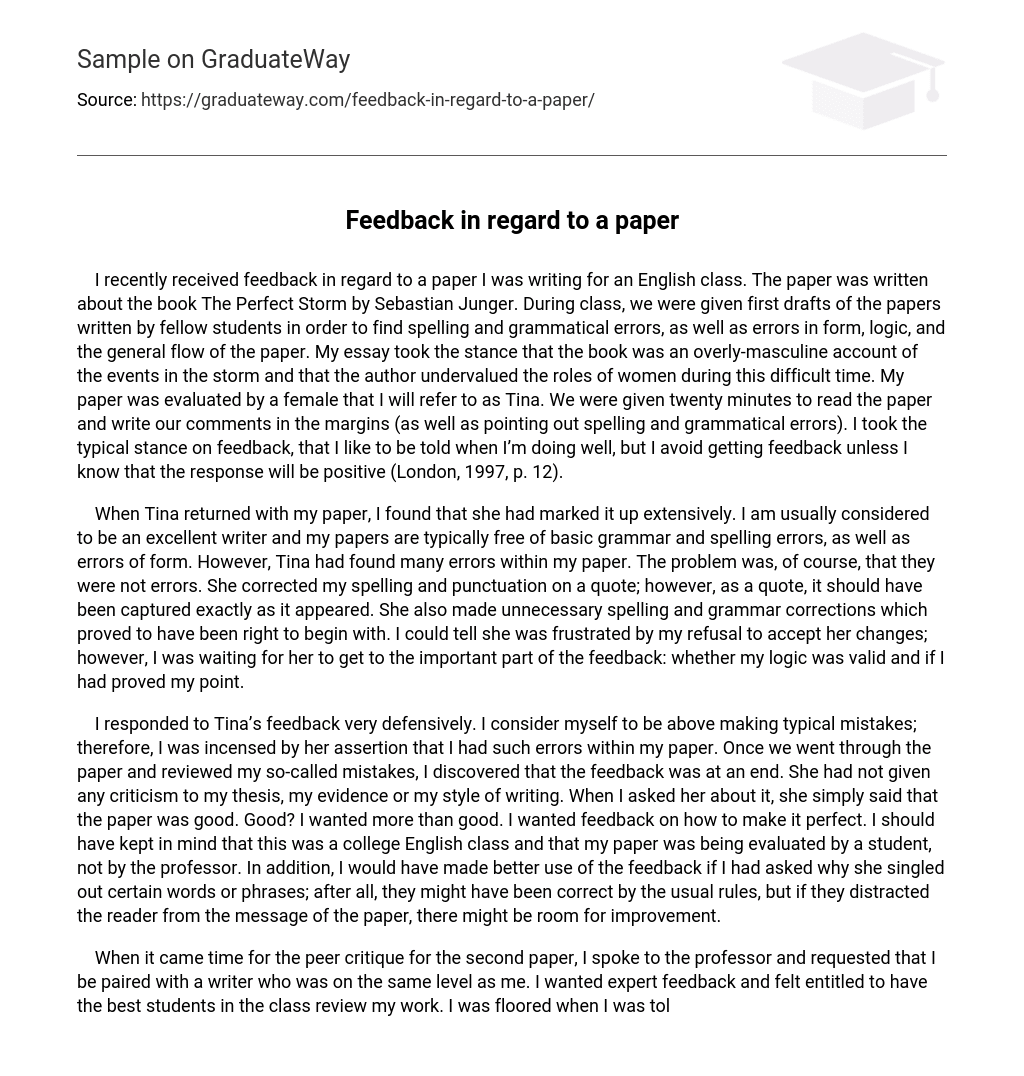I recently received feedback in regard to a paper I was writing for an English class. The paper was written about the book The Perfect Storm by Sebastian Junger. During class, we were given first drafts of the papers written by fellow students in order to find spelling and grammatical errors, as well as errors in form, logic, and the general flow of the paper. My essay took the stance that the book was an overly-masculine account of the events in the storm and that the author undervalued the roles of women during this difficult time. My paper was evaluated by a female that I will refer to as Tina. We were given twenty minutes to read the paper and write our comments in the margins (as well as pointing out spelling and grammatical errors). I took the typical stance on feedback, that I like to be told when I’m doing well, but I avoid getting feedback unless I know that the response will be positive (London, 1997, p. 12).
When Tina returned with my paper, I found that she had marked it up extensively. I am usually considered to be an excellent writer and my papers are typically free of basic grammar and spelling errors, as well as errors of form. However, Tina had found many errors within my paper. The problem was, of course, that they were not errors. She corrected my spelling and punctuation on a quote; however, as a quote, it should have been captured exactly as it appeared. She also made unnecessary spelling and grammar corrections which proved to have been right to begin with. I could tell she was frustrated by my refusal to accept her changes; however, I was waiting for her to get to the important part of the feedback: whether my logic was valid and if I had proved my point.
I responded to Tina’s feedback very defensively. I consider myself to be above making typical mistakes; therefore, I was incensed by her assertion that I had such errors within my paper. Once we went through the paper and reviewed my so-called mistakes, I discovered that the feedback was at an end. She had not given any criticism to my thesis, my evidence or my style of writing. When I asked her about it, she simply said that the paper was good. Good? I wanted more than good. I wanted feedback on how to make it perfect. I should have kept in mind that this was a college English class and that my paper was being evaluated by a student, not by the professor. In addition, I would have made better use of the feedback if I had asked why she singled out certain words or phrases; after all, they might have been correct by the usual rules, but if they distracted the reader from the message of the paper, there might be room for improvement.
When it came time for the peer critique for the second paper, I spoke to the professor and requested that I be paired with a writer who was on the same level as me. I wanted expert feedback and felt entitled to have the best students in the class review my work. I was floored when I was told that I was the best writer in the class, that I was light years ahead of anyone else, and finally, that I needed to use the critique session as a way to help other students with their papers rather than seeing it strictly as an opportunity for myself. I have to admit that I hadn’t thought of it that way. I took her statement seriously and was paired with a student whose essay needed serious help. I threw myself into the task wholeheartedly, giving the writer advice about basic structure as well as finding a good thesis and the right evidence to back it up. A tip that would have been helpful:
Because students may be reluctant to receive “bad news” on their creations, ease of reading and ease of reviewing seem to be important characteristics for choice of medium. I want to maximize the chance that students will actually read and learn from the feedback. (Byrne, 1997)
The writer was grateful for my help and sheepish in her admission that she couldn’t find anything wrong with my paper. I made a point of focusing the attention on her paper, as I learned that feedback is just as important to give as it is to receive.
Works Cited:
Byrne, R. (1997). Written Feedback on Student Assignments: Another Look. Business Communication Quarterly, 60(2), 100+.
London, M. (1997). Job Feedback: Giving, Seeking, and Using Feedback for Performance Improvement. Mahwah, NJ: Lawrence Erlbaum Associates





